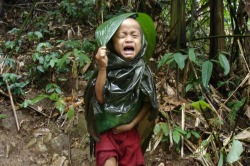Burma's Genocide of Karen People

by Pete Pattison
When the Burmese soldiers arrived at his village, Maung Taungy knew what would happen next. Seven villagers were arrested, their feet bound together with rope, and they hung upside down for hours. Exhausted and their ankles lacerated, the men, suspected of being linked to the Karen resistance army, were beaten. The soldiers did not stop until they were dead.
“After that”, remembers Maung Taungy, an ethnic-minority Karen from eastern Burma, “we became the virtual slaves of the army. They ordered us to clear the whole jungle so that they could see approaching enemies. We had to wade through chest-deep water full of snakes to get the area cleared. The work was endless, we made roads, dug trenches, cut bamboo and made fences. We had no choice but to escape.
An estimated 27,000 Karen have fled the Burmese army in northern Karen State, which began last February: 55,000 Karen remain in hiding in the jungles bordering Thailand. They are refugees from the world’s longest-running civil war, between the Burmese army and the Karen resistance, the Karen National Liberation Army. More than one million Karen have been displaced since 1996 in the face of systematic human rights violations including rape, forced labor, and torture.
And the situation is worsening. “We’d faced problems with the Burmese army since 1960’s, but the situation now is worse than ever,” says Maung. According to the Thailand Burma Border Consortium, in the past year alone 232 villages in eastern Burma have been destroyed, forcibly relocated or otherwise abandoned. The Karen Human Rights Group claims the most recent offensive by the Burmese army is part of a deliberate policy of ethnic cleansing that amounts to crimes against humanity. The UN is stalling because Russian and China voted against any help. They are instead giving arms to Burma’s regime.
Burmese troops force Karen civilians to relocate to villages already under their control. Old villages are burnt down and land-mines to stop villagers from returning. Forced labor is demanded for months at time. Anyone caught leaving is shot. Without access to their farms, many Karen suffer severe food shortages.
A testimony of a Karen woman who escaped while heavily pregnant took two weeks to reach a safe camp called Ei Tu Tha Camp. She was told by the medics that her baby was dead inside her womb. It was the fifth child she had lost. “Our whole village was burnt down by Burmese soldiers. Since then we have been hiding in the surrounding jungle. The soldiers would shoot anyone they saw, even children,” she said. “If they found rice they would burn it, they cut holes in our cooking pots and tore up our clothes. The journey here was very difficult. We arrived at one village expecting to be able to buy food , only to find that they were also getting ready to leave and so they wouldn’t sell any to us. One of my children died in the jungle before we left and another died when we reached this camp. It was hard to leave our village, but if we had stayed there we would all be dead.”
Many of the Karen living here in Denver and other places around the United States could tell you of the same stories, but they are smiling and able to carry on with their lives. They are gentle and shy and have said over and over how grateful they are for the safe haven of Thailand and I know they feel the same with those in America who reach out to help them. No wonder David Eubank and his wife and three children spend 3 months traveling in the jungle bringing hope, medicine, food and clothing to those they can reach. You can access their website and see for yourself this is no fable. You can help him as he tells you what is needed. I am asking you to pray that God would bring them out as He did the Hebrews from Egypt.
www.freeburmarangers.org or www.prayforburma.org
